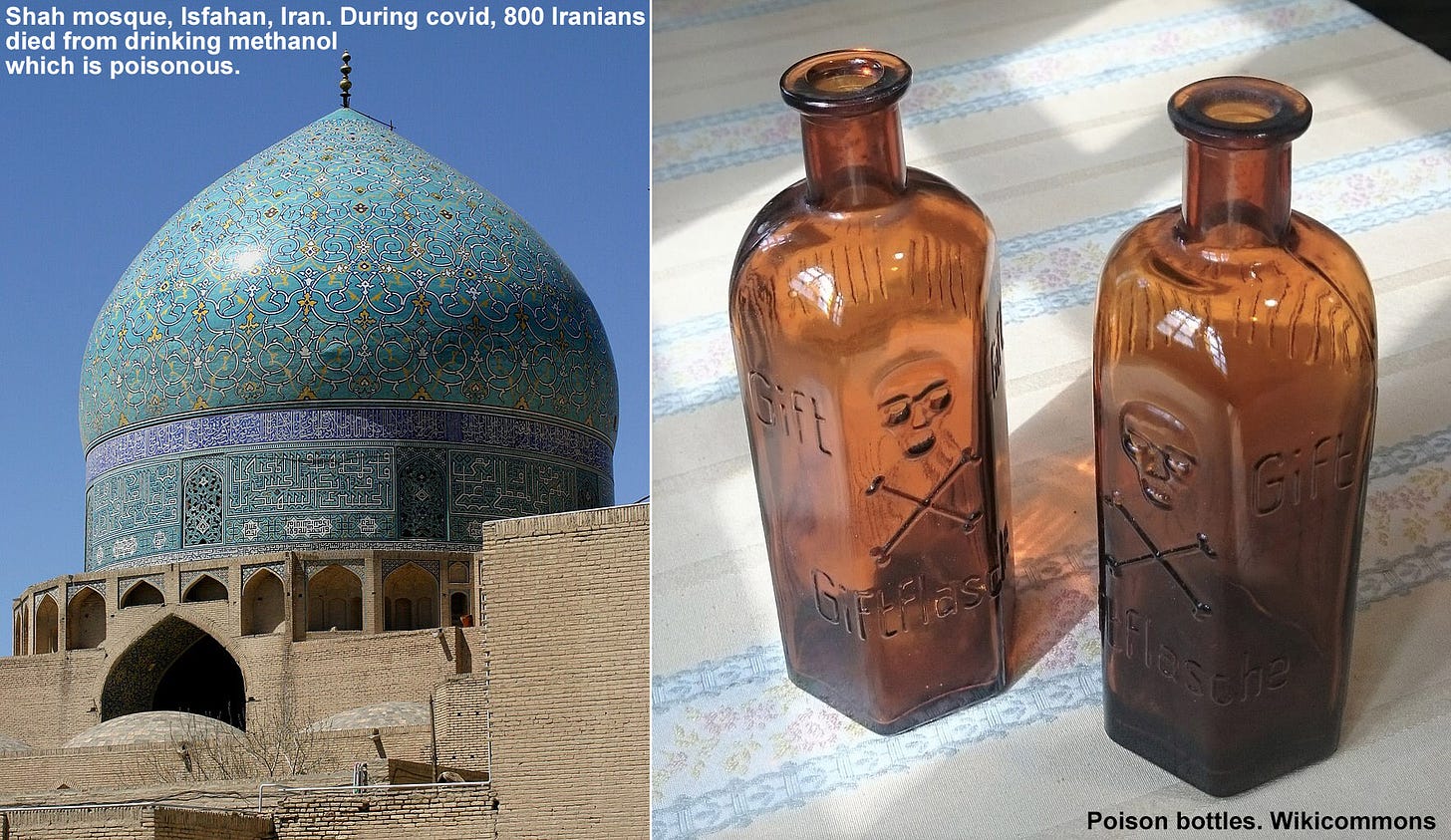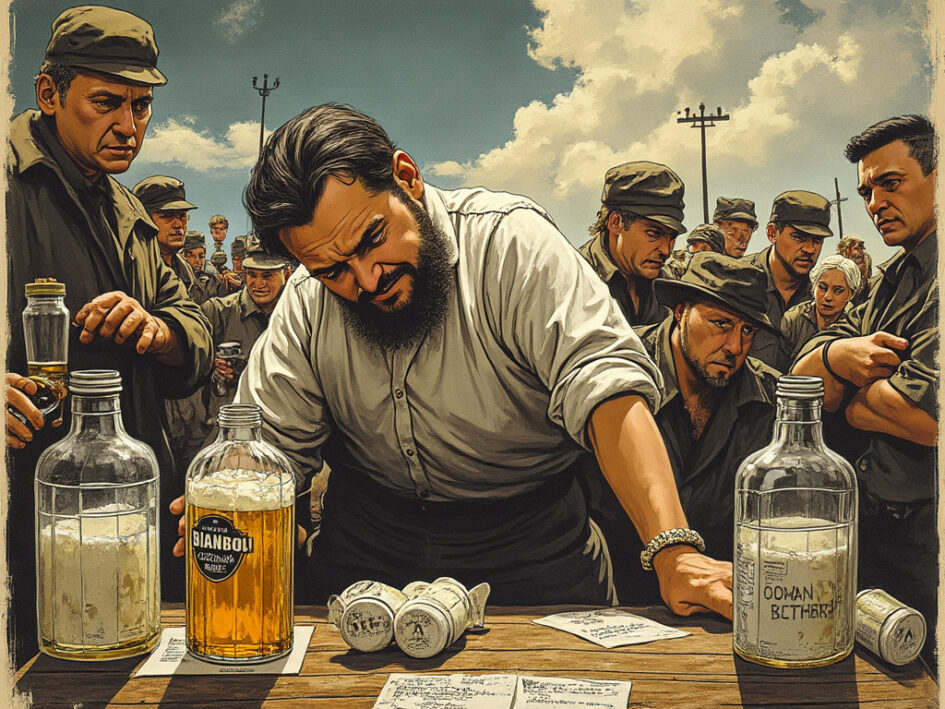By Alison Bevege: Letters from Australia
Alcohol is banned in the Islamist theocracy. When covid curfew came, demand went up so bootleggers put bleach in methanol killing 800 people. Australia blames it on “misinformation”.
The following referenced information shows just how dodgy and fake the government’s case for its censorship legislation truly is.
The Federal Government is once again floating its new internet censorship law, called the Communications Legislation Amendment (Combatting Misinformation and Disinformation) Bill 2024.
This Bill deputises digital platforms to police government censorship, removing what Australian Communication and Media Authority (ACMA) and the Communications Minister deem to be “misinformation” off the internet.
“Misinformation” and “disinformation” are just jargon terms for “being wrong” and “lying”.
This Bill rests on the assumption that spreading errors and lies online is such a danger to the public that legislation curtailing free speech is required to protect the nation from “serious harm”. The Impact Assessment states that: “to the extent that there is any burden on the freedom of political communication, this must be justified”.
The proponents of this Bill have overstated the risks of “misinformation” and underestimated the dangers of censorship.
Digital platforms have enabled the rapid spread of errors and lies, but only because they enable the rapid spread of all information including correct information and good ideas. The antidote to false information has never been censorship. It has always been a well-educated population that knows how to evaluate evidence and think critically.
Nobody, including the government, Australian Communications and Media Authority (ACMA) or health authorities, can define the difference between “misinformation” and “truth”, because nobody has a monopoly on truth. The entire history of human thought is one of unassailable truths being overturned later as complete fallacies.
On this basis alone the legislation is unable to achieve its objective of keeping the public safe from the “serious harms” of bad information.
DEAD IRANIANS USED TO JUSTIFY THIS CENSORSHIP PUSH
The specific examples of harm given by the Impact Assessment to justify this Bill prove this point. They are full of errors, such as those claimed by a literature review of 14 studies from October 2021.
“In one example the report investigated, a popular myth in Iran suggested that consumption of pure alcohol (methanol) could eliminate the virus. This claim resulted in 800 deaths and 5,876 hospitalisations due to methanol poisoning,” the Impact Assessment said.
This is not true.
The Iranian source study used to make that claim explicitly says “it is unclear how many Iranians drank adulterated alcohol for recreational purposes or as gastrointestinal “disinfectant” to prevent—or treat—COVID-19 infection.”
Iranians were locked down under curfew – there’s no way to know if they were drowning their sorrows or responding to “misinformation”.
The source study makes it clear that the people did not deliberately drink methanol, which is poisonous. They accidentally drank methanol because alcohol (ethanol) is illegal in the Islamic theocracy of Iran. As a result, bootleggers added bleach to methanol to take out the warning colouring and sold it as ethanol.

This is nothing new for Iran. In September 2018, before the pandemic, 768 people suffered methanol poisoning of whom 76 died, for exactly the same reason: bootleg alcohol cut with methanol.
The problem is not “misinformation”. The problem is criminal bootleggers.
The Impact Assessment then references a UK/US “randomised controlled trial” that looked at how exposure to online “misinformation” affected intent to vaccinate, and made the embarrassing assumption that the gene-vaccines would lead to herd immunity.
The study couldn’t even tell “misinformation” from fact.
Participants were shown five images of “misinformation” with a control set of “factual information”.
One “misinformation” tweet stated: “Scientists have expressed doubts over the effectiveness of a coronavirus vaccine that has been rushed to human trials, after all the monkeys used in initial testing later contracted coronavirus.” The tweet pointed to a story in which a former Harvard medical professor agreed the AstraZeneca vaccine had not stopped transmission.
The claim was true. All the monkeys did catch the virus. When released to the public, the gene-vaccines again failed to prevent the catching or spreading of covid.
Another “misinformation” tweet stated: “A virus with a 99.6% survival rate for people under 70 but the entire world needs to take a vaccine? I’m no Sherlock Holmes but something’s fishy about all that”.
The study authors classed it as “misinformation” because the tweet questioned the necessity of a worldwide vaccination campaign. But the tweet was correct – covid was highly age-stratified, leaving little need for those aged under 70 to inject an mRNA product with a 1-in-800 risk of severe injury. The median covid infection fatality rate for unvaccinated people was only 0.07 percent for people aged under 70.
Of the “factual information” shown to controls, some of it was false.
For example, a “factual” tweet included from CEPI claiming vaccination was “the way out of this devastating pandemic” was wrong.
CEPI is an organisation dedicated to promoting mRNA as a platform for 100-day “lab to jab” vaccination, with a vested interest in exaggerating pandemic severity and promoting vaccines. The study authors classed this tweet as “factual” because health authorities agreed. But it wasn’t true. Other experts who said it was unwise to use a leaky vaccine in a pandemic were ignored. This was a contested opinion and not a fact.
The research relied on to make the case for serious covid “misinformation” harms is itself completely unreliable. This is junk science.
The government itself has proven the case that it cannot be trusted to censor the internet for “misinformation” in relation to preventative health measures.
A FEW BIG CORPORATIONS WILL POLICE YOU
The Department of Infrastructure, Transport, Regional Development, Communications and the Arts says it has identified 48 digital communications platform providers that may fall under the scope of the Australian Communications and Media Authority’s (ACMA’s) censorship powers, including 34 small platform providers.
Under the preferred and most invasive censorship option, the Impact Assessment estimates the total regulatory costs at $16.3 million per year.
Clearly this introduces a barrier for new innovators who cannot bear these costs. It provides a moat for a few large centralised social media firms. The government will remove the free market and control the internet by working hand-in-glove with favoured corporations who will benefit.
WE ALREADY HAVE LAWS TO DEAL WITH SERIOUS HARMS
The onus is on the proponents to show that existing legislation is inadequate to prevent “serious harms” from online behaviour.
The Impact Assessment describes an example of serious “misinformation” harms to election integrity as claims that 2022 Federal Election ballot papers were found near bins in Port Macquarie.
However, as the Impact Assessment itself notes, the Australian Electoral Commission solved the problem by investigating and posting a note on social media.
Electoral processes are safeguarded in Australia by extensive legislation both federally and in individual states and territories. The existing laws cover everything from the display of posters, false and misleading statements, the registration of political parties, funding disclosure and ballot papers.
Similarly, the other areas flagged for potential “serious harm” are already governed by existing legislation.
Discrimination against and vilification of minority groups can be prosecuted under existing laws. Criminal law at both federal and state level deals with incitement to violence. Existing laws deal with damaging critical infrastructure or disrupting emergency services.
Using existing legislation removes the matter to the legal system where appropriate judgments about harm and damage can most appropriately be made. This also preserves legal rights including that of due process.
“Harm to the economy” including to “public confidence in the banking system” is a vague concept that cannot be legislated against. Further, if the banking system should be on the verge of collapse then it would be correct for the public to have no confidence in it. The remedy is not censorship but to ensure the banking system is sound.
There are already rules to govern fraud and false advertising without the need to censor the internet.
UNINTENDED CONSEQUENCES CAN BE DEADLY
The government has not properly considered the dangerous risks posed by this censorship.
Weak protections have been included for “professional news content” subject to existing media codes of practise, and for parody, satire, academic, artistic, scientific and religious content, which are defined as “excluded content”.
However, these exclusions are undermined by the rest of the Bill, especially where justified by the subjective terms of “safety” and “serious harm”.
“Subdivision B—General principles relating to misinformation codes and misinformation standards” includes “preventing monetisation” at (e). In practise, that means if the government dislikes an alternative news provider on Substack or YouTube, they can demonetise them, driving off independent journalists who cannot earn an income.
It supports fact-checkers at (f). During the pandemic, fact-checkers were used to discredit dissidents and denounce opponents of the covid vaccine mandates. For example, Facebook “fact-check” censored a BMJ investigative report featuring whistleblower Brook Jackson who exposed poor clinical trial practises at Ventavia, a contract firm conducting Pfizer’s Phase Three covid vaccine trials.[18]
This Bill will suppress adversarial journalism that seeks to hold government to account.
By threatening large fines for non-compliance, the Bill ensures that digital platforms will set their AI surveillance and algorithms to target anything that might get them into trouble. This was seen during covid, when medical professors who signed the Great Barrington Declaration opposing lockdowns were suppressed so their voices were not heard.
While the digital platforms will make the codes of practise, they will only be able to make codes that ACMA likes. ACMA has the whip hand. This unelected bureaucracy will have the power to approve the codes, and if it thinks they are deficient then it can set new standards, delete old ones or write a whole new code. This is built into the legislation in sections 57 and 58 onwards.
This Bill enables the Communications Minister to determine by legislative instrument what they want to be considered as misinformation “reasonably likely to cause or contribute to serious harm”. ACMA also has the ability to tinker with the requirements under this Bill. Parliament won’t be able to interfere. This gives scope for the rules to change later at the whim of a Minister or unelected bureaucracy in damaging ways that can’t be foreseen.
Further, the Bill enables ACMA to become a spy agency keeping dossiers on people who have been wrong on the internet.
“Subdivision B – Information Gathering” allows for ACMA to obtain documents and information not just from the digital platform but also from “other persons” – third parties. The Bill allows ACMA to keep these documents as long as it likes.
The danger created by this Bill does not resemble the fictional world of Orwell’s 1984 so much as the real-life nightmare of the USSR.
In the 1930s, an agricultural scientist called Trofim Lysenko was put in charge of Soviet agriculture. He climbed the bureaucracy because he said “yes” to the politburo. He was a powerful science bureaucrat and nobody could oppose his ideas.
Lysenko said he could teach spring wheat to grow in autumn, dramatically boosting crop yields. Together, Joseph Stalin and Lysenko “modernised” Soviet agriculture with the collectivisation of farms and Lysenko’s poorly-tested hypothesis of educating grain.
There was no adversarial press to challenge bad ideas.
These bizarre agricultural experiments ended in famine and the deaths of up to seven million Russians. Lysenko was never punished, his portrait hung on walls. His power diminished only after Stalin died in 1953.
That is the deadly danger of this censorship Bill. Safety is guaranteed only by a free and adversarial opposition that the government can’t control by registration, industry standards or the centralised ownership of a few big players.
Our lives depend on the ability to freely challenge orthodoxy including medical authority guidelines.
THIS BILL MUST BE SCRAPPED IN FULL
One of the brightest of a new generation of Australian journalists, to follow Alison Bevege’s excellent work go to her Substack page HERE.


